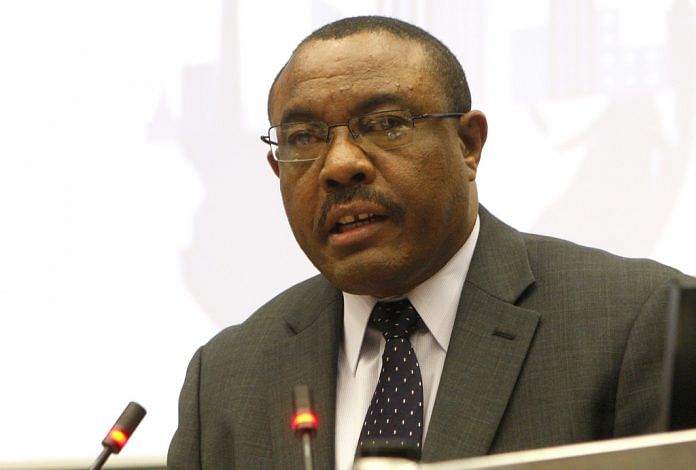The battle for succession has begun
The Ethiopian People’s Revolutionary Democratic Front announced at the start of the year that they would release and pardon many of the country’s political prisoners, before retracting the statement. Strikes and protests broke out across the country, and the government released some prominent journalists and politicians. The situation deteriorated with a shock resignation: the prime minister himself.
“On February 15th came the sudden resignation of Hailemariam Desalegn, the beleaguered prime minister and chairman of the EPRDF, who said he was stepping down because of the “unrest and political crisis [that] have led to the loss of lives” and that he wished to be “part of the solution”,” writes the Economist.
“His time in office has been marked by a deadly cycle of anti-government protests stifled only temporarily by a nine-month state of emergency. The prime minister is said to have tried to resign more than once over the past year, though colleagues persuaded him to stay in his post until at least this year’s party congress, which had been scheduled for March but is widely expected to be postponed until later in the year.”
“His departure has opened up a succession struggle within the coalition that has governed Ethiopia since it first seized power as a ragtag band of rebels in 1991,” the Economist writes. The ERPDF is a coalition of of ethnically-based parties, and one member party has now rebranded itself as a “quasi-opposition party” that wants to take the helm and champion the cause of the Oromos. Lemma Megersa, the leader of the Oromo People’s Democratic Organisation, is a running favourite.
“Hailemariam says he will stay in office until a successor is found. Whoever it is will face powerful headwinds,” the Economist writes.
The aftermath of war in Iraq
Fifteen years on, Iraq still hasn’t recovered from American invasion, writes Emily Thornberry in The Guardian.
“Just in the past four weeks, we have seen unprecedented levels of escalation, aggression and land-grabbing by the competing foreign powers enmeshed in this terrible war.”
Thornberry describes the environment in 2003, and argues that the present scenario isn’t too different. Referring to Jeremy Corbyn’s speech, she writes that “he asked why we could afford to spend billions on a war nobody wanted while children around the world were dying of poverty and starvation. And he warned of the risks in invading Iraq: “It will set off a spiral of conflict, of hate, of misery and of desperation that will fuel the wars, the conflict, the terrorism, the depression and misery of future generations.””
“The US announces plans for an “open-ended” occupation of northern Syria; Turkey launches a brutal assault on Kurdish-held areas; Russian and coalition bombers trade devastating blows against each other’s proxy armies; Israel launches its biggest air strikes inside Syria for 36 years in response to Iran sending a drone across its borders; and the Gulf states continue to feed money and weapons to the dwindling opposition and jihadist militias,” she writes.
“Millions of us marched with Corbyn 15 years ago. And make no mistake – we may soon need to march with him again,” she writes.
Liberals need to do something about Venezuela
The crisis in Venezuela has been met with almost deafening silence across the world, writes Bret Stephens in the New York Times. When popular movements have marched for causes like the Vietnam War, Gulf War, apartheid an ethnic cleansing, why can’t they march for a crisis happening in “America’s backyard”, he asks.
“The case of Venezuela ought to be an especially worthy one for college students. It is urgent. It is close by. Its victims are fighting for democracy, for human rights, for the ability to feed their children.”
“So why the relative silence? Part of the reason is that campus activism is a left-wing phenomenon, making it awkward to target left-wing villains,” he writes.
“That leaves the cause of Venezuela’s deliverance from evil in the hands of … Mike Pence. The vice president may not be the ideal spokesman for the rights of a Latin American country, at least in the eyes of the typical undergraduate political activist. And some of the Trump administration’s policy prescriptions, such as broad sanctions on the Venezuelan economy, may do more to tighten Maduro’s grip than to crush it. (More effective are U.S. sanctions on Venezuelan government officials, which target the guilty and spare the innocent.)”
“Still, it says something about the moral dereliction of too many liberals that Pence has been a clarion voice of attention and outrage at the unfolding catastrophe, while they mostly remain silent. When you’ve ceded the moral high ground to the Trump administration, you’ve ceded a piece of your soul.”
“It would be nice to suppose that Venezuela’s agonies will soon be at an end, on the theory that it can’t go on like this much longer. People said that about Syria several years ago, too. How many more Venezuelans have to starve or drown before Western liberals do something more than merely shake their heads?” he asks.



